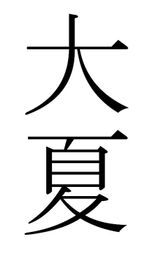- Daxia
-
For other uses, see Daxia (disambiguation).
Daxia, Ta-Hsia, or Ta-Hia (Chinese: 大夏; Pinyin: Dàxià) is the name given in antiquity by the Han Chinese to the territory of Bactria.
The name Daxia appears in Chinese from the 3rd century BCE to designate a mythical kingdom to the West, possibly a consequence of the first contacts with the expansion of the Greco-Bactrian Kingdom, and then is used by the explorer Zhang Qian in 126 BCE to designate Bactria.
In the chapter VIII of the Guanzi, Xiao Kuang, it is written:
"In the west [Duke Huan]... having passed through the valleys of the Taihang and Bier, took captive the chief of the Da Xia. Further to the west, he subjugated the Xi Yu of Liusha, and for the first time the Rong People of Qin were obedient."
Taihang and Bier are located along the Shanxi-Hebei border in China.
The reports of Zhang Qian were put in writing in Shiji ("Records of the Great Historian") by Sima Qian in the 1st century BCE.
They describe an important urban civilization of about one million people, living in walled cities under small city kings or magistrates. Daxia was an affluent country with rich markets, trading in an incredible variety of objects, coming as far as Southern China. By the time Zhang Qian visited Daxia, there were no longer a major king, and the Bactrian were suzerains to the nomadic Yuezhi, who were settled to the north of their territory beyond the Oxus. Overall, Zhang Qian depicted a rather sophisticated but demoralized people who were afraid of war.
Following these reports, the Chinese emperor Wudi was informed of the level of sophistication of the urban civilizations of Ferghana, Bactria and Parthia, and became interested in developing commercial relationships with them:
- "Thus the emperor learned of Dayuan, Daxia, Anxi, and the others, all states rich in unusual products whose people cultivated the land and made their living in much the same way as the Chinese. All these states, he was told, were militarily weak and prized Han goods and wealth." Shiji 123.[1]
These contacts immediately led to the dispatch of multiple embassies from the Chinese, initiating the development of the Silk Road.
Footnotes
- ^ The Records of the Grand Historian. Han Dynasty II (Revised Edition), p. 236, by Sima Qian. Translated by Burton Watson. Columbia University Book. 1993. ISBN 0-231-08167-7 (pbk)
Categories:- Ancient peoples
- Former countries in Chinese history
- History of China
- Central Asia
Wikimedia Foundation. 2010.

